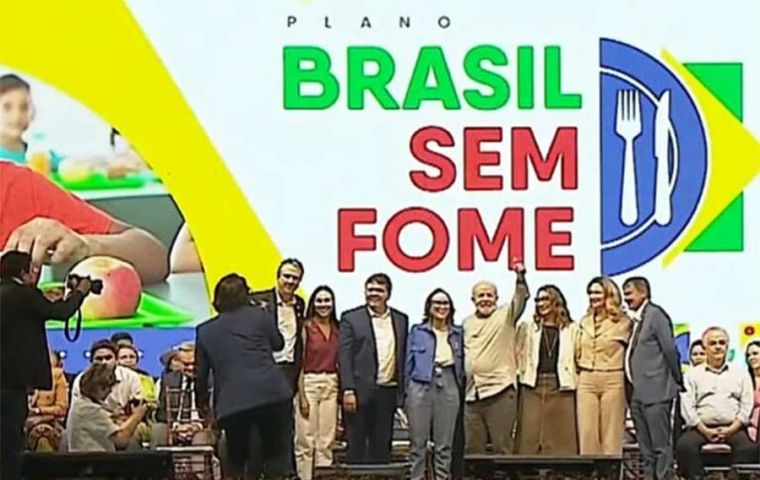MercoPress. South Atlantic News Agency
Lula launches Brazil Without Hunger program
 “I'm obsessed with fighting hunger,” Lula said in Teresina
“I'm obsessed with fighting hunger,” Lula said in Teresina President Luiz Inácio Lula da Silva Thursday launched the Brazil Without Hunger program in Teresina, the capital of the State of Piauí, Agencia Brasil reported.
“I want workers to once again be able to have three meals a day in a dignified manner and to provide quality food for their children. The work goes on,” Lula said upon setting in motion the initiative devised by the Interministerial Chamber for Food and Nutritional Security (Caisan), which brings together 24 ministries and includes a set of 80 actions and public policies to achieve around 100 goals.
“Brazil is a rich country with a lot of land. They say that if you plant here, everything will grow. The problem is not a lack of food, it's not a lack of planting. The problem is that people don't have the money to have access to food. That's why we'll only truly end hunger when we've ensured that all working people have jobs,” Lula also pointed out.
“I'm obsessed with fighting hunger, making the Brazilian economy grow, and generating quality jobs for people,” he added. “There is nothing more sacred than for a mother to put her family around the table and have plenty of food for them to eat until their bellies are full,” he went on.
Brazil had left the United Nations (UN) Hunger Map in 2014, through food and nutrition security strategies implemented over the previous decade, during the previous governments of Lula and former President Dilma Rousseff, but returned to the scene in the following years, especially during the Covid-19 pandemic.
Data from the global State of Food Security and Nutrition in the World report, released by five specialized UN agencies, shows that one in ten Brazilians (9.9%) experienced severe food insecurity between 2020 and 2022. According to the same study, almost a third (32.8%) of the country's population is included in the severe or moderate food insecurity categories, which is equivalent to 70.3 million Brazilians. The situation shows a worsening of access to food security in the country. Previous data, from 2014 to 2016, indicated a percentage of 18.3%.
“We are once again going to take Brazil off the hunger map. From this government onwards, we will be following a set of actions to reduce poverty in Brazil year by year,” said Social Development Minister Wellington Dias.
“You don't end hunger with a program and an action, you end hunger with a collective government commitment. And not just the federal government, but the state and municipal governments. And we, civil society, have a responsibility to accompany the actions of this plan step by step,” said the president of the National Council for Food and Nutritional Security (CONSEA), Elisabetta Recine.
CONSEA was created in the early 1990s under Itamar Franco but was dismantled in 2019 under Jair Bolsonaro. The reinstatement of CONSEA was one of the first measures of the Lula government. The council is seen as the main instrument for civil society's dialogue with the federal government and has representatives in all the states and the Federal District.




Top Comments
Disclaimer & comment rulesCommenting for this story is now closed.
If you have a Facebook account, become a fan and comment on our Facebook Page!